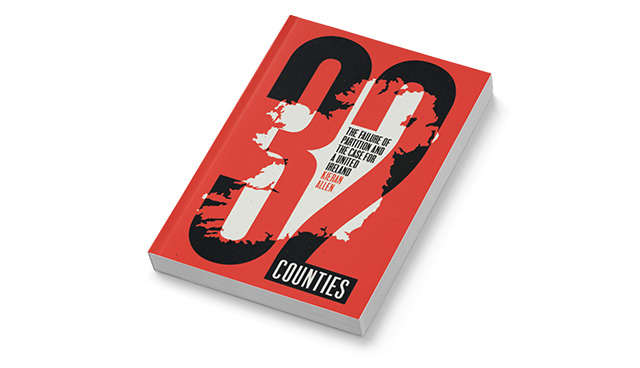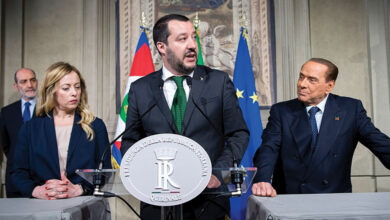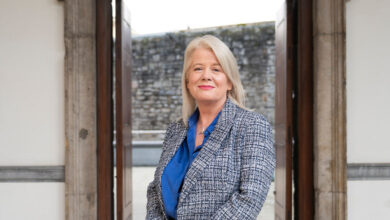The failure of partition

When Ireland was divided in 1921, few people thought that partition would last 100 years. Not that there is much reason to celebrate, writes Kieran Allen, senior lecturer in sociology at University College Dublin, and author of 32 Counties: The Failure of Partition and the Case for a United Ireland.
Consider only the strangeness of Irish politics. Where else in Western Europe would the first move to depose a political leader arise because she abstained on a vote on conversion therapy? Where else would a primary school system be 94 per cent owned by the Catholic Church, there being no public education at this level in the South? In neither part of Ireland did a substantial labour or social democratic party emerge. There was simply no left-right divide.
Why? The conventional answer is that there are two cultures or two identities on the island. A Protestant British one versus a Catholic Irish one.
But let’s deconstruct. The South can hardly be labelled a Papist, priest-ridden state when it was the first country in the world to vote for marriage equality by popular suffrage. If it is defined by its Catholic identity, why did it vote by 66 per cent to legalise abortion? And if a Protestant identity in the North is so strong, why do only 43 per cent attend church regularly?
Religious identity was supposed to be the foundation stone for partition, but it makes little sense today. Instead, there is talk about a fundamental difference between ‘Britishness’ and ‘Irishness’.
Yet these concepts are extremely vague. The ‘Britishness’ of a member of the Orange Order differs fundamentally from a multi-cultural Londoner. As one not unsympathetic writer on unionism put it, the allegiance of the former is ‘to a form of national imperial Britishness whose origins remain associated with a bygone empire nostalgia’.
We should, therefore, be more precise. The dominant strain of unionism is not just based on a ‘cultural’ disposition rooted in deep psychic identity. We are really talking about right wing political views.
Far from partition being the ‘logical outcome’ of two cultures, it locked the population of Ireland into spurious identities that sustained conservative regimes. The northern and southern states were mirror images of each other. The supposed threats that one posed to the other were used to discipline their respective populations.
The origins of partition can be traced to an alliance that the Tory party forged with a Unionist movement to undermine British democracy. In 1911, the Liberal Party introduced a Parliament Act which removed the veto of the House of Lords. This infuriated the Tory backwoods and they focused on opposing Home Rule as a war cry to unite their divided party. Home Rule, it should be added, was an extremely mild measure for devolution within the empire.
Their principal ally was Edward Carson, a spokesperson for aristocracy and a conservative politician. Known as ‘Coercion Carson’ for prosecuting tenants, he was a vigorous opponent of trade unionism, denouncing the 1906 Trade Union Disputes Act which allowed workers to strike without incurring massive penalties. Famously he helped jail Oscar Wilde for his homosexuality.
When the Tory leader Bonar Law reviewed the mass ranks of the Ulster Volunteers in Balmoral in 1912, he told them explicitly that “you hold the pass for the Empire”. In words not heard since the English Civil War, he denounced his government as “a revolutionary committee which has seized power by fraud upon despotic power. In our opposition to them, we shall not be guided by considerations which would influence us in ordinary political struggle. We shall use any means to deprive them of the power they usurped”.
“Far from partition being the ‘logical outcome’ of two cultures, it locked the population of Ireland into spurious identities that sustained conservative regimes. The North and southern state were mirror images of each other. The supposed threats that one posed to the other were used to discipline their respective populations.”
Given this disdain for democracy, it is no surprise that a Tory dominated cabinet later rejected the results of an all-island election in 1918 which gave an overwhelming majority for those who wanted a united independent Ireland. This same attitude of contempt will again be shown when Boris Johnson will not allow the Scots to hold a referendum on independence.
If partition arose from a right wing, pro-imperial outlook, its effect was to fossilise identities. In most other situations, identities are fluid, hybrid and subject to change. Today, for example the past, division between Catholics and Protestants in Glasgow finds its legacy in a rivalry between Celtic and Rangers, but both can unite in opposition to a poll tax or in wider political outlooks. The Northern state, however, has organised its politics around a supposed clash and rewards those who are the hardest champion of ‘their side’. While the Belfast Agreement was welcomed because it brought peace, it only updates and modernises the management of this sectarian division.

Ironically, behind the communal disagreements between the DUP and Sinn Féin lays a shared economic agenda, namely running down the public sector and providing generous grants to multi-nationals to benefit from low wages. The figures show that the median wage for both Catholic and Protestant workers was a mere £10.58 an hour in 2017. The scandalous offer of a 1 per cent pay rise for nurses from the Stormont Executive sums it up.
The winds of change are blowing across Ireland. Yet the ending of partition will not come through a stitching together of two dysfunctional states. Shifting sovereignty from London to Dublin but continuing a ‘consociational regime’ in Stormont is a recipe for continued sectarian conflict. Joining the North to a southern tax haven, as advocated by the Hubner report that is frequently quoted by Sinn Féin, will mean a lack of basic public services. In Dublin today, for example, applicants for a council house wait an average of 12 years!
Irish unity can only be realised through radical change that involves a challenge to both Irish states. Instead of seeing the southern state as the agent to begin the ending partition, we need radical social movements from below that forces change. The movement for abortion rights which won a Repeal referendum in the South and then turned its attention to the North, is precisely the model.
We need a different, alternative Ireland that can show real benefits to working people. One that guarantees the right to housing, decent wages, a free health care system, free creche facilities. The prospect of such an Ireland is the only one that can answer the cries of insecurity that comes with the ending of partition.





